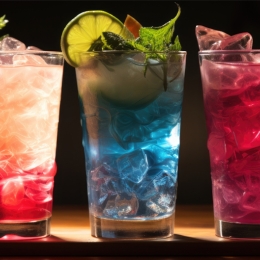Misleading food ads abound. Here are 7 of the latest.
You’ve gotta hand it to ad execs.
They can turn a sugary snack into a source of “wholesome” energy or “real fruit.” Or reinvent processed meat as “healthy protein.” Or spin salt-laden refined grains as “real meals.”
Here’s how not to fall for what they’re pushing.
Bowlful of baloney

“Mighty Quaker Oats, a bowlful of nourishment,” says the TV ad for Quaker Apples & Cinnamon Instant Oatmeal. “They’re heart-healthy.”
Pretty much any food that’s at least half whole grains is allowed to make that claim, as long as it’s low in saturated fat, isn’t high in sodium, and bears this sentence in the ad’s fine print:
“Diets rich in whole grain foods and other plant foods and low in saturated fat and cholesterol may help reduce the risk of heart disease.”
But the FDA’s outdated rules don’t limit sugar in foods that make “heart disease” claims. So it doesn’t matter that Quaker Apples & Cinnamon Instant has more sugar than apples. (Each packet has 8 grams—2 teaspoons—of added sugar.)
Want a healthier oatmeal? Add some apple, berries, peaches, or other fruit to unflavored oats.
And how does Quaker turn its skimpy packet into the brimming “bowlful of nourishment” seen in the ad? “2 servings shown,” says the fine print.
Clif cookie?

“It takes energy to take on the world,” says the Clif Bar TV ad featuring tennis superstar Venus Williams, among others. “We bake in delicious, wholesome ingredients.”
Each hefty 2½ oz. Chocolate Chip bar has 250 calories and 16 grams (4 tsp.) of added sugar. That’s “wholesome”?
Maybe a pro like Williams needs lots of calories—that’s what “energy” means—to fuel hours of training. But for most folks in the ad, maybe not. They’re taking a workout class, lifting weights, shooting hoops. (If you’re looking for a bar to stand in for a mini-meal, there are better ones.)
Could Clif just want an excuse to sell the rest of us a glorified “energy” cookie? Nah.
Land O’processed meat

“You guys are crushing it!” shouts the man coaching sandwich exercisers in the TV ad. “Let’s get those buns toasting, bread!” A cheese-woman doing squats exclaims, “I’m getting shredded!”
Are the “8 grams of healthy protein in Land O’Frost Premium Meat” the secret to “shredded” muscles? Nope. It’s those squats, push-ups, and lunges. Most of us eat plenty of protein, but we fall short in the strength-training department.
What’s more, the processed meats shown in the ad—Oven Roasted Turkey Breast and Old World Style Black Forest Ham—are a far cry from “healthy protein.” A mere 2 oz. serving (four slices) packs 560 to 580 milligrams of sodium (a quarter of a day’s worth). And all processed meats raise the risk of cancer, according to the International Agency for Research on Cancer.
So much for “premium meat.”
Not magic beans

“Ready to shine from the inside out?” asks the TV ad for Nature’s Bounty Advanced Hair, Skin & Nails Gummies and Jelly Beans, which contain over “two times more biotin” than the company’s original formula.
Biotin deficiencies are rare, so you don’t need a supplement, certainly not one with 200 times a day’s worth.
Companies don’t need rigorous evidence to back up what they promise as long as no disease is mentioned. They’re free to use claims about your hair, skin, and nails to sell jelly beans.
The kicker: The ad fails to mention the warning on the bottle that says, in part: “If you are pregnant, nursing, taking any medications, planning any medical or surgical procedure, have any medical condition, or are planning to undergo any clinical lab testing, consult your doctor before use. Some supplements may interact with certain medications and/or interfere with certain lab tests.”
Taking high doses of biotin can even cause a false result on some tests that are used to diagnose a heart attack, says the FDA. All for a supplement you don’t even need.
A wee bit more fruit

“Say oui to something new! A subtly sweet French style yogurt, now with more real fruit,” says the voiceover in the TV ad for Oui by Yoplait French Style Yogurt.
The ad’s fine print: “20% more fruit on all fruit-on-bottom Oui by Yoplait yogurt flavors.” Of course, when you’re starting out small, 20 percent more ain’t much.
Take the new “more fruit” Strawberry variety. It has more cane sugar than strawberries. That explains why each petite 5 oz. pot delivers 14 grams (3½ teaspoons) of the stuff. You call that “subtly sweet,” Yoplait?
Truly good marketing

“Real fruit juice,” says the TV ad for Truly Hard Seltzer, which shows berries galore. “Our best flavors just got better.”
New hard seltzer brands are popping up daily. Why not set your brand apart with fruit juice? A spritz is all it takes. Truly Strawberry Lime, for example, has 2 percent juice—about 1½ teaspoons in the 12 oz. can.
Of course, even if Truly were adding more fruit juice, those liquid calories wouldn’t make its alcohol any better for you. When it comes to alcohol and your health, it’s simple: The less, the better.
But if you enjoy sweet alcoholic drinks and want to minimize empty calories from added sugar, hard seltzer—any brand, not just Truly—is a good bet.
Claims like “made with real fruit juice” matter, but only to make life easier for the marketing team.
Real good?

“Here’s to real flavors. Real meals. Real good,” says the TV ad. “All of Knorr’s high-quality Pasta and Rice Sides are now made with no artificial flavors or preservatives.”
It’s a move straight out of Big Food’s playbook: Ditch some additives, then pitch your ultra-processed food as real.
So what if Knorr’s packets are mostly cheap white rice or pasta with some 500 to 700 mg of sodium per serving and next-to-no vegetables! Maybe that’s why the home cooks in the ad are adding their own fresh spinach, cabbage, tomatoes, beans, and more.
Sounds like a real good deal...for Knorr.
Continue reading this article with a NutritionAction subscription
Already a subscriber? Log in
More on deceptive marketing
How supplements distort science to sell
Supplements

April Fools! Watch out for these food label tricks
Fact vs. Fiction

Is this juice? Or is it alcohol?
Industry Accountability

Don't be duped by these food ads
Fact vs. Fiction

Is that food really "carbon neutral"?
Sustainability


